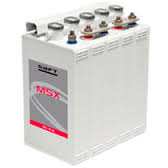
Saft, the world’s leading designer and manufacturer of high-tech industrial batteries, has signed an on-board battery system replacement contract valued at around € 4 million with SNCF, France’s national state-owned railway operator. In its largest single contract with a European railway operator for the past 10 years, Saft is enabling SNCF to migrate its entire fleet of more than 200 TER 2N NG (double-decker new generation) trainsets to state-of-the-art nickel-based batteries that ensure improved performance and reliability over a long service life.
The nickel-cadmium-based batteries are expected to last 15 years compared to the 3 – 5 years for lead-acid batteries. Additionally, the much longer lifetime and lower levels needed for maintenance of the NiCd batteries easily offsets the initial higher cost of the system.
SNCF’s TER 2N NG trainsets that first entered service in 2000 are based on the Alstom Coradia Duplex electric multiple unit (EMU) platform. These trains, which are capable of speeds up to 160 km/h, are ideally suited to densely loaded intercity or suburban services and are deployed on SNCF regional routes across France.

The on-board batteries play a critical role for SNCF by providing the backup power to support control, safety and communications functions should the main power supply be interrupted. As part of a general upgrading programme SNCF is replacing the existing time-expired lead-acid batteries with Saft’s specialized MRX batteries.
The switch to nickel-based technology is delivering a number of performance and reliability advantages for SNCF. Primarily, unlike lead-acid batteries, the MRX design does not suffer from ‘sudden death’. Instead, it has been developed specifically for the intensive usage typical of rail backup operations, where it offers predictable and reliable performance over a long service life of up to 15 years that contributes to an optimized Total Cost of Ownership (TCO). Furthermore, MRX batteries offer a higher energy capability at extreme temperatures, ranging from – 30°C to + 70°C, to ensure continuity of train services especially for routes in locations in France that experience severe winters.
An additional benefit of the MRX batteries is their compact, lightweight design that has enabled each SNCF battery system to be reduced in weight by 90 kg – equivalent to the average weight of a single passenger. As well as reduced maintenance requirements, an important advantage for train operators is the integrated water filling system that makes topping-up fast and simple.
“Saft is delighted that SNCF has switched from lead-acid batteries to our nickel-based MRX batteries for this prestigious, high value contract. It is a further, very important European reference for the performance, reliability and total cost of ownership advantages of our well-proven nickel-based rail battery technology ” says Ghislain Lescuyer, Chairman of Saft’s Management Board.
The contract covers the supply of a total of 284 battery systems for the SNCF double-decker trainsets, made of “54 MRX130” batteries. The battery systems feature Saft’s innovative patented design, based on a riveted battery box that is extremely simple and cost-effective to manufacture as it eliminates welding.
First deliveries to SNCF started in the third quarter of 2015. For more information go to:
Advertisement
Learn more about Saft Batteries





